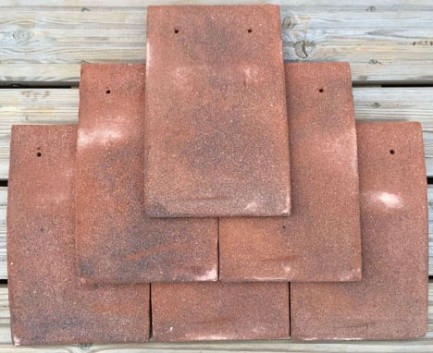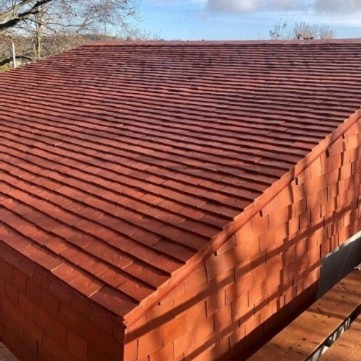High Quality Roof Tiles in Oxfordshire
Heritage Tiles: Emblematic of the finest craftsmanship
Heritage tiles are the professional roofer's choice for the highest quality clay roof tiles. We pride ourselves in manufacturing, stocking, and delivering the very finest in prestige clay roof tiles.
Heritage Tiles have several tile ranges that satisfy every architectural requirement. Vintage and historic properties right up to modern new builds are covered by the diverse range of clay roof tiles that we stock.
So, whether you are in the building trade, or simply wish to choose your own tiles, Heritage Tiles have the right product for your specific requirements.
What Heritage Tiles have to offer our customers?
- We offer specification and technical solutions to help you achieve the perfect build.
- We also offer expert design advice to all our customers.
- We are happy to engage in site visits with our clients.
- We have stockists and distributors throughout the United Kingdom to ensure that we can provide our expert service to a wider area.
- We can provide estimated quantities from plans supplied by our clients.
- We offer battening plans.
- We can deliver a standard and bespoke colour choice for our clay tile products.
- All our tiles are assessed and approved by Lucideon.
- We provide a nationwide delivery and collection service.
The ranges of clay roof tiles we supply.
The Clayhall Range of roof tiles:

Clayhall Medium Blend - Carefully crafted to replicate all the features of handmade the Clayhall hand crafted range of tiles offers an excellent alternative when budget restrictions are a concern, but without compromising quality or durability.
Clayhall Dark Blend - Quality and durability in a budget clay roof tile. The Clayhall dark blend is sure to turn heads.
Clayhall Red Blend - A beautiful rustic clay roof tile. The Clayhall red blend is a firm favourite with our customers.
Clayhall Hamlet Mix - The Clayhall Hamlet mix is a gorgeous light and sandy looking clay roof tile that is a perennial favourite in the building trade.
Clayhall Birchwood Mix - The Clayhall Birchwood mix offers a gorgeous blend of lighter and darker shades in this diverse clay roof tile. If you are concerned that your roof tiles could look monotonous, the Clayhall Birchwood mix is the clay roof tile to choose.
The Conservation Range of roof tiles

The Conservation range of roof tiles are available in a range of distinctive colours, created by using a very fine sand, The Conservation Weathered; A natural warm tone, achieving an instant mellow and settled look and The Conservation Red; perfect for vertical tiling especially suited for villages and hamlets with olde world vernacular charm.
Manufactured using high quality clay, achieving high strength and durability properties, giving homeowners and contractors peace of mind for many years to come. The conservation range comes with a complete set of associated fittings, including Hog Back Ridge, Half Round Ridge, Bonnet Hips, Valley tiles and External Angles.
The Conservation range of clay roof tiles comes in the following variations:
- Conservation Red
- Conservation Weathered
- Conservation Dark
Conservation Peg Tile
Plain clay roofing tiles laid to a double lap have been used for roof covering in England since before the Norman Conquest and tiles dating back to Roman Times have been discovered under excavation. From the outset clay plain tiles were made incorporating fixing features.
The Classic Edwardian roof tile
The Classic range of plain tiles is one of the finest ranges of clay tiles.
We source only the best raw materials for our craftsman to create beautifully handmade clay tiles of the highest quality and durability.
Tile Fittings available from Heritage Tiles
There are many fittings that are available from us a Heritage Tiles to complete your build to perfection. We stock and supply the following:
- Gable Tile
- Eave Tile
- Baby Porch Ridge
- 90 Degree Ext. Angle
- Universal Bonnet Hip
- Half Round Ridge
- Hogs Back Ridge
- Mono Ridge
- Third Round Ridge
- Universal Valley
- Ornamental Club
- Bat Tile Set
Bat Tiles:
Provide help for our bats with our range of bat friendly roof tiles.
Did you know that all UK bats and their roosts are protected by law? The Wildlife and Countryside Act introduced in 1981, gave legal protection to all bat species and their roosts in England.
Distinct species of bats prefer differing places to roost. The two most usually found species of bat in the UK are the Pipistrelle and Brown Long-Eared Bat. Pipistrelle prefer confined spaces such as under tiles on roofs and hanging spaces. The Brown Long-Eared Bat prefer roof timbers and ridges inside lofts. Heritage Clay Tiles can provide purpose made access points within your roof tiles or ridge tiles. The Bat Tile Set can form part of a mitigation package required by law for existing roosts or as potential access where a roost had not previously been present.
Select a Blend
Getting the right blend for your roofing project can feel daunting, but with our blend generator you can mix and match various blends of tiles to achieve the perfect blend.
Click here to make use of our online tool to choose your own unique blend.
Because our strict quality control provides a consistent tile size you can mix assorted styles and colours of tiles to make your roof unique to you. Please use the tool below to experiment with various blends.
Adjust the sliders to set the ingredients for your desired blend then click on the update mix button.
Alternatively click on any blend or tile to display it.
Whatever type of clay roof tile you want, Heritage Tiles will be able to help.
High Quality Roof Tiles
High quality roof tiles from Heritage Clay Tiles Ltd versus cheaper tiles
If you want to save some of money on cheaper roof tiles, consider why they are much cheaper than high quality roof tiles. Roof tiles and their quality really are critical considerations for roofing. High quality roof tiles are a must if you want to avoid expensive repairs and replacements in the very near future. The simple fact is that high quality roof tiles are far superior to cheaper, bargain basement roof tiles.
The differences between high quality roof tiles and cheap tiles
High quality roof tiles are made from high quality materials; in short, you get what you pay for! Roofing tiles usually come in either terracotta or concrete. Both have their advantages and provide very distinctive looks depending on what the home owner was looking to achieve. Concrete tiles are made from good quality concrete, which is very consistent and strong. Although concrete roof tiles are not as sought after as slate or clay, the quality of the concrete is still an important issue.
Poor quality concrete is inferior, it is weak, and it wears quickly, allowing a good deal of water to penetrate the tile. A high quality roof tile made from concrete avoids this situation.
High quality roof tiles from Heritage Clay Tiles Ltd are durable and long lived
You may never need to replace high quality roof tiles. The cheaper varieties of tiles, however, will definitely give you trouble sooner or later and usually take a few repair jobs to replace them. High quality roof tiles can last longer than the property itself.
High quality roof tiles look great too
Cheap roofing tiles stick out like a sore thumb, whereas high quality roof tiles just look the part wherever they are installed. Cheap roof tiles are usually pretty plain looking and often quite thin and have irregular shapes and jagged edges. High quality roof tiles look great and offer a vast selection of colour choices. For roofers, these tiles are the go to roof tiles, because their quality is excellent and they are so much easier to work with.
Cheap tiles don't save you money
If you buy cheap roof tiles, you're not saving much up front. High quality roof tiles aren't much more expensive than the cheap tiles, but they out last and outperform the cheap ones all day long. For a little more money, you can get a far superior tile, which definitely won't cause the problems that low-quality roof tiles will inevitably have.
The bottom line, in this case, is that expert roofers don't want anything to do with poor-quality roof tiles. Leading roofers won't even stock them and they'll advise you against false economies if you're thinking of buying low-quality tiles. The advice is to always buy high quality roof tiles and have them expertly installed by qualified professional roofers.
Just remember that going for that deal of a lifetime in roof tiles may just end up costing you far more than it would have if you'd bought high quality roof tiles in the first place. Consider the quality, durability and longevity of a roof tile before you part with your cash.
A little information about Oxfordshire
Abingdon in Oxfordshire
Abingdon-on-Thames, commonly known as Abingdon, is a historic market town in Oxfordshire. Historically, it was the county town of Berkshire, since 1974 Abingdon has been administered by the Vale of White Horse district within Oxfordshire. The area was occupied from the early to middle Iron Age and the remains of a late Iron Age and Roman defensive enclosure lies below the town centre. Abingdon Abbey was founded around 676, giving its name to the emerging town. Charters for the holding of markets and fairs were granted by various monarchs, from Edward I to George II.
Some facts about Abingdon in Oxfordshire
The Oxfordshire town survived the dissolution of the abbey in 1538. During the 18th and 19th centuries, with the building of Abingdon Lock in 1790, and the Wilts and Berks Canal in 1810, this made the Oxfordshire town a key link between major industrial centres such as Bristol, London, Birmingham and the Black Country. In 1856 the Abingdon Railway opened, linking the town with the Great Western Railway at Radley. The Wilts & Berks Canal was abandoned in 1906 but a voluntary trust is now working to restore and re-open it. Abingdon railway station was closed to passengers in September 1963. The line remained open for goods until 1984, including serving the MG car factory, which operated from 1929 to October 1980.
History of Abingdon in Oxfordshire
A Neolithic stone hand axe was found at Abingdon. Analysis in 1940 identified the stone as epidotised tuff from Stake Pass in the Lake District, 250 miles to the north. Stone axes from the same source have been found at Sutton Courtenay, Alvescot, Kencot and Minster Lovell. The Oxfordshire town has been occupied from the early to middle Iron Age and the remains of a late Iron Age defensive enclosure lies below the town centre. The oppidum was in use throughout the Roman occupation. A Neolithic causewayed enclosure was found in Abingdon in 1926, dating to the 36th or 37th century BC.
Abingdon Abbey was founded in Saxon times, possibly around 676, but its early history is confused by numerous legends, invented to raise its status and explain the place name. The name seems to mean 'Hill of a man named Aebba, or a woman namedAebbe', possibly the saint to whom St Ebbe's Church in Oxford was dedicated. However, Abingdon in Oxfordshire stands in a valley and not on a hill. It is thought that the name was first given to a place on Boars Hill above Chilswell, and the name was transferred to its present site when the Abbey was moved.
In 1084, William the Conqueror celebrated Easter at the Abbey and it is possible that his son Henry I received some schooling at the Oxfordshire abbey.
Oxfordshire's wool trade flourishes in Abingdon
In the 13th and 14th centuries, Abingdon in Oxfordshire was a flourishing agricultural centre with an extensive trade in wool and a famous weaving and clothing manufacturing industry. The abbot seems to have held a market from very early times and charters for the holding of markets and fairs were granted by various sovereigns, from Edward I to George II. In 1337 there was a famous riot in protest at the Abbot's control of this market in which several of the monks were killed. After the abbey's dissolution in 1538, the Oxfordshire town sank into decay and, in 1556, upon receiving a representation of its pitiable condition, Mary I granted a charter establishing a mayor, two bailiffs, twelve chief burgesses and sixteen secondary burgesses, the mayor to be clerk of the market, coroner and a JP.
The county hall and court house were built between 1678 and 1682, to assert this status. The building, now the Abingdon County Hall Museum, was reputedly designed by Christopher Kempster, who worked with Sir Christopher Wren.
Products available from Heritage Clay Tiles Ltd in East Sussex
Clay Roof Tiles in East Sussex
Clayhall Roof Tiles in East Sussex
Conservation Roof Tiles in East Sussex
Edwardian Roof Tiles in East Sussex
Victorian Roof Tiles in East Sussex
Georgian Roof Tiles in East Sussex
Handmade Clay Tiles in East Sussex
Handmade Roof Tiles in East Sussex
High Quality Roof Tiles in East Sussex
Traditional clay tiles in East Sussex
Traditional roof tiles in East Sussex
Products available from Heritage Clay Tiles Ltd in Essex
Conservation Roof Tiles in Essex
High Quality Roof Tiles in Essex
Traditional clay tiles in Essex
Traditional roof tiles in Essex
Products available from Heritage Clay Tiles Ltd in Hampshire
Clayhall Roof Tiles in Hampshire
Conservation Roof Tiles in Hampshire
Edwardian Roof Tiles in Hampshire
Victorian Roof Tiles in Hampshire
Georgian Roof Tiles in Hampshire
Handmade Clay Tiles in Hampshire
Handmade Roof Tiles in Hampshire
High Quality Roof Tiles in Hampshire
Traditional clay tiles in Hampshire
Traditional roof tiles in Hampshire
Products available from Heritage Clay Tiles Ltd in Hertfordshire
Clay Roof Tiles in Hertfordshire
Clayhall Roof Tiles in Hertfordshire
Conservation Roof Tiles in Hertfordshire
Edwardian Roof Tiles in Hertfordshire
Victorian Roof Tiles in Hertfordshire
Georgian Roof Tiles in Hertfordshire
Handmade Clay Tiles in Hertfordshire
Handmade Roof Tiles in Hertfordshire
High Quality Roof Tiles in Hertfordshire
Traditional clay tiles in Hertfordshire
Traditional roof tiles in Hertfordshire
Products available from Heritage Clay Tiles Ltd in Kent
Conservation Roof Tiles in Kent
High Quality Roof Tiles in Kent
Traditional clay tiles in Kent
Traditional roof tiles in Kent
Products available from Heritage Clay Tiles Ltd in London
Conservation Roof Tiles in London
Edwardian Roof Tiles in London
Victorian Roof Tiles in London
High Quality Roof Tiles in London
Traditional clay tiles in London
Traditional roof tiles in London
Products available from Heritage Clay Tiles Ltd in Surrey
Conservation Roof Tiles in Surrey
Edwardian Roof Tiles in Surrey
Victorian Roof Tiles in Surrey
High Quality Roof Tiles in Surrey
Traditional clay tiles in Surrey
Traditional roof tiles in Surrey
Products available from Heritage Clay Tiles Ltd in West Sussex
Clay Roof Tiles in West Sussex
Clayhall Roof Tiles in West Sussex
Conservation Roof Tiles in West Sussex
Edwardian Roof Tiles in West Sussex
Victorian Roof Tiles in West Sussex
Georgian Roof Tiles in West Sussex
Handmade Clay Tiles in West Sussex
Handmade Roof Tiles in West Sussex
High Quality Roof Tiles in West Sussex
Traditional clay tiles in West Sussex
Traditional roof tiles in West Sussex
Products available from Heritage Clay Tiles Ltd in Bedfordshire
Clay Roof Tiles in Bedfordshire
Clayhall Roof Tiles in Bedfordshire
Conservation Roof Tiles in Bedfordshire
Edwardian Roof Tiles in Bedfordshire
Victorian Roof Tiles in Bedfordshire
Georgian Roof Tiles in Bedfordshire
Handmade Clay Tiles in Bedfordshire
Handmade Roof Tiles in Bedfordshire
High Quality Roof Tiles in Bedfordshire
Traditional clay tiles in Bedfordshire
Traditional roof tiles in Bedfordshire
Products available from Heritage Clay Tiles Ltd in Berkshire
Clayhall Roof Tiles in Berkshire
Conservation Roof Tiles in Berkshire
Edwardian Roof Tiles in Berkshire
Victorian Roof Tiles in Berkshire
Georgian Roof Tiles in Berkshire
Handmade Clay Tiles in Berkshire
Handmade Roof Tiles in Berkshire
High Quality Roof Tiles in Berkshire
Traditional clay tiles in Berkshire
Traditional roof tiles in Berkshire
Products available from Heritage Clay Tiles Ltd in Buckinghamshire
Clay Roof Tiles in Buckinghamshire
Clayhall Roof Tiles in Buckinghamshire
Conservation Roof Tiles in Buckinghamshire
Edwardian Roof Tiles in Buckinghamshire
Victorian Roof Tiles in Buckinghamshire
Georgian Roof Tiles in Buckinghamshire
Handmade Clay Tiles in Buckinghamshire
Handmade Roof Tiles in Buckinghamshire
High Quality Roof Tiles in Buckinghamshire
Traditional clay tiles in Buckinghamshire
Traditional roof tiles in Buckinghamshire
Products available from Heritage Clay Tiles Ltd in Cambridgeshire
Clay Roof Tiles in Cambridgeshire
Clayhall Roof Tiles in Cambridgeshire
Conservation Roof Tiles in Cambridgeshire
Edwardian Roof Tiles in Cambridgeshire
Victorian Roof Tiles in Cambridgeshire
Georgian Roof Tiles in Cambridgeshire
Handmade Clay Tiles in Cambridgeshire
Handmade Roof Tiles in Cambridgeshire
High Quality Roof Tiles in Cambridgeshire
Traditional clay tiles in Cambridgeshire
Traditional roof tiles in Cambridgeshire
Products available from Heritage Clay Tiles Ltd in Oxfordshire
Clay Roof Tiles in Oxfordshire
Clayhall Roof Tiles in Oxfordshire
Conservation Roof Tiles in Oxfordshire
Edwardian Roof Tiles in Oxfordshire
Victorian Roof Tiles in Oxfordshire
Georgian Roof Tiles in Oxfordshire
Handmade Clay Tiles in Oxfordshire
Handmade Roof Tiles in Oxfordshire
Traditional clay tiles in Oxfordshire
Traditional roof tiles in Oxfordshire
Products available from Heritage Clay Tiles Ltd in Suffolk
Clayhall Roof Tiles in Suffolk
Conservation Roof Tiles in Suffolk
Edwardian Roof Tiles in Suffolk
Victorian Roof Tiles in Suffolk
Georgian Roof Tiles in Suffolk
Handmade Clay Tiles in Suffolk
Handmade Roof Tiles in Suffolk
High Quality Roof Tiles in Suffolk
Traditional clay tiles in Suffolk
Traditional roof tiles in Suffolk
Further Information
If you would like to know more or are interested in a quote we would be happy to help. Phone us on 01634 471 344, email us at sales@heritagetiles.co.uk and we will be in touch as soon as possible.







